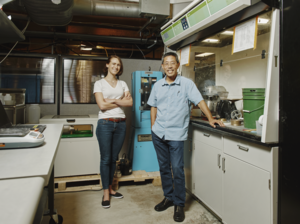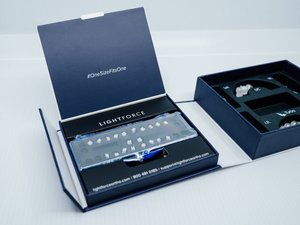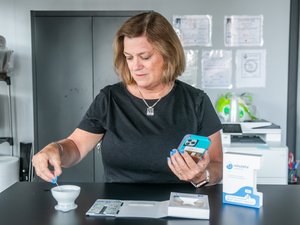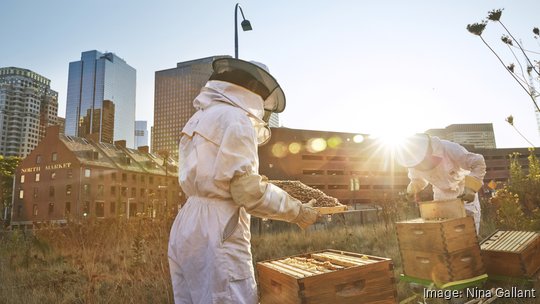
The Best Bees Company started out as a Facebook page that Noah Wilson-Rich created in 2010 from his South End living room. He had recently completed his Ph.D. in biology from Tufts University, and was interested in researching and reducing the incidence of bee colony collapses.
His new venture sold beehives to people in the Boston area. His customers got to keep the honey, and he was able to collect data on bees and fund his research. That first year, he sold seven beehives. The next year it was 12, and the third year he set up 65 new hives.
Wilson-Rich and his founding partner, Sean Cahill, a software engineer and corporate operations professional, have grown Best Bees into a company whose beehives are now set up in home gardens, on college campuses and atop commercial real estate properties in 22 cities.
Thirteen years in, Best Bees is now in the process of raising $4 million to upgrade its in-hive technology to improve data collection and introduce a new approach to saving bees from hive collapses.
Business is buzzing
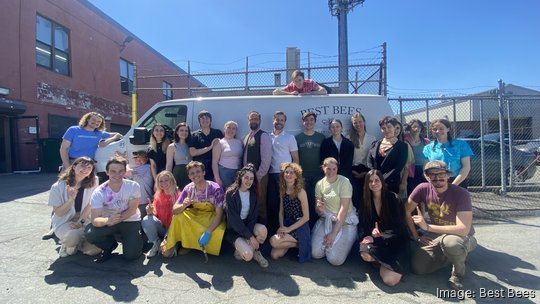
From that Facebook page and South End apartment, Best Bees has grown into what Wilson-Rich says is a “$5 million dollar annual recurring revenue company” with over 100 employees.
The company has its headquarters in Roxbury where it breeds its bees and builds beehives.
Around Boston, Best Bees’ hives can be found in places like the Fairmont Copley Plaza and at Harvard Business School.
Wilson-Rich described Best Bees’ services as similar to a garden service or pool service. The company installs and manages research beehives. Customers just need to have a two-by-three-foot space to install a hive. Best Bees sends beekeepers around to its hives about once a month to inspect the hive, record data in its proprietary software system and collect honey.
The hives have sensors inside them to measure things like temperature, humidity, weight and even sound.
“When bees are sick, they actually sound kind of sad,” Wilson-Rich said. “We can hear if the queen is there. So this is really how our clients help advance our new research.”
One of the company’s research projects was looking at plant DNA and honey genomics. Their work was published in National Geographic in 2018.
“That’s how we get data from the honey we’re tasting and build communities and share with people what our neighborhoods taste like,” Wilson-Rich said.
Saving bees from colony collapses
The company was a reaction to a phenomenon seen in 2006 and 2007, when beekeepers began to notice their bees dying in unusually high numbers. The Environmental Protection Agency reported that 30-90% of hives perished during that winter.
There were several reasons behind this spike in deaths, Wilson-Rich said. One was the growing prevalence of the varroa mite — aptly named the varroa destructor — that attacks and feeds on honey bees. Wilson-Rich said pesticides, habitat loss and climate change have also been identified as factors behind bee deaths.
Best Bees is raising money to boost its ability to track bee health and kill varroa mites. The company has raised an initial $100,000 of its $4 million goal, according to a U.S. Securities and Exchange Commission filing.
“What we’re working on now for our current investor round is putting remote sensors in there — data sensors to make them into smart hives,” Wilson-Rich said.
Right now, Best Bees collects around 77 data points. With the new hardware and software it’s raising money to roll out, Wilson-Rich said Best Bees would be able to collect up to 1,000 data points.
The hardware is a base that holds up the beehive and collects data remotely. The board also heats up the hive to a point bees can stand, but the mites cannot, Wilson-Rich said. The mites will then dislodge from the bees and fall onto the board and perish. There is also an AI camera to measure the amount of mites that die.
“By scaling this technology, it not only helps advance our mission to improve bee health, but it also helps our competitive advantage because there are other players in the space. But we’re the only research beekeeping service. And it increases our profit margin, because we don’t have to send our 100 beekeepers out to our client sites as frequently to open the lid and say, ‘Are you alive?’ We’ll know through remote sensors yes they’re alive and here’s how healthy they are,” Wilson-Rich said.
Sign up for The Beat, BostInno’s free daily innovation newsletter from BostInno reporter Hannah Green. See past examples here.
